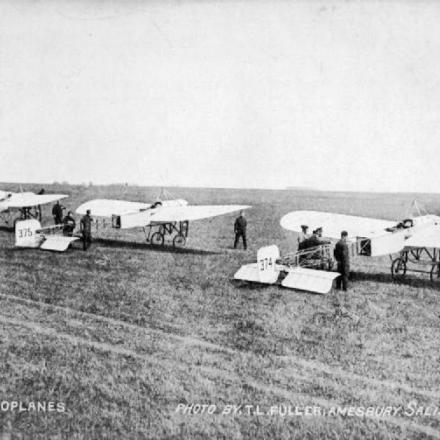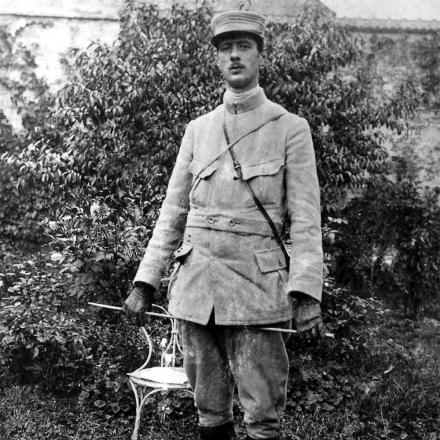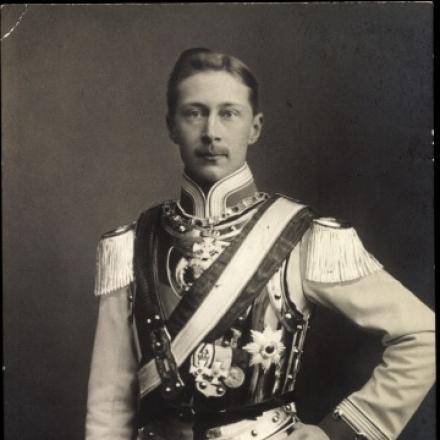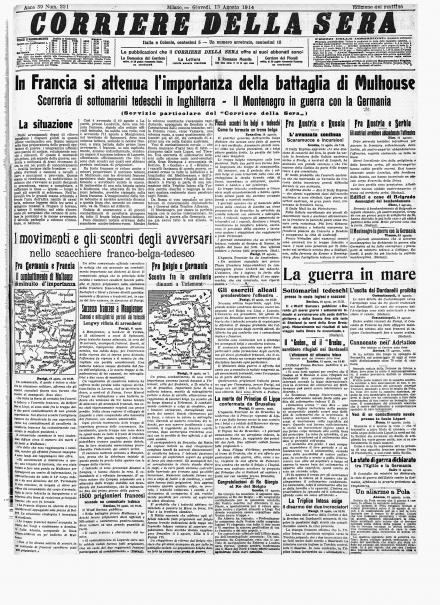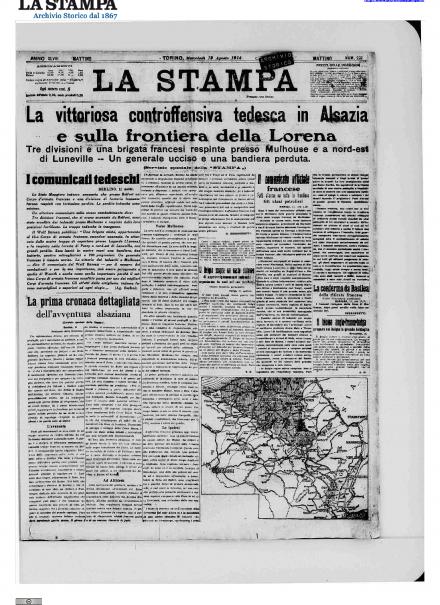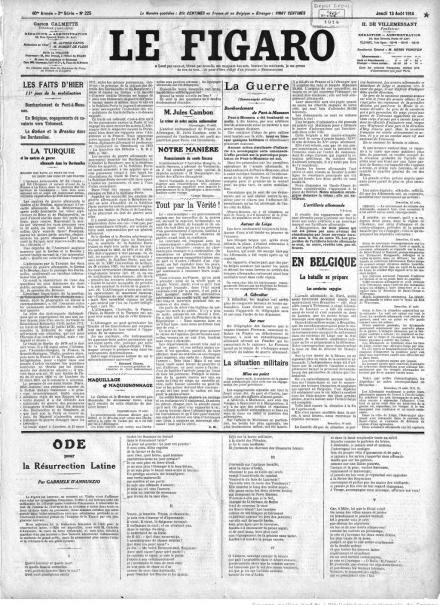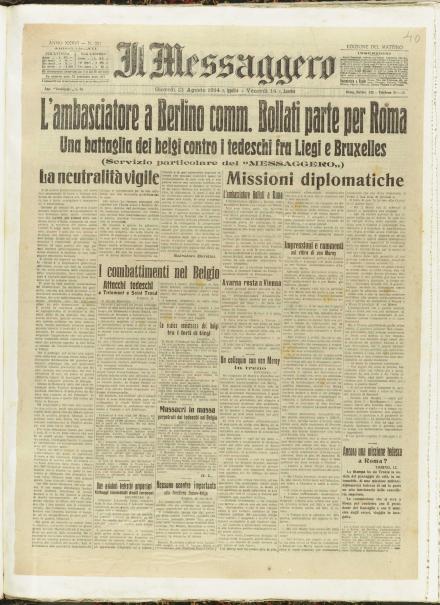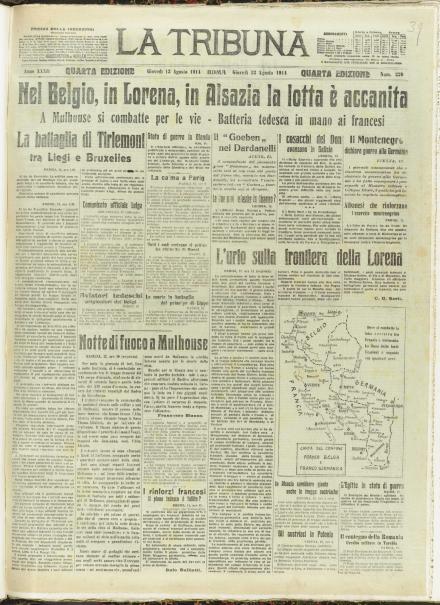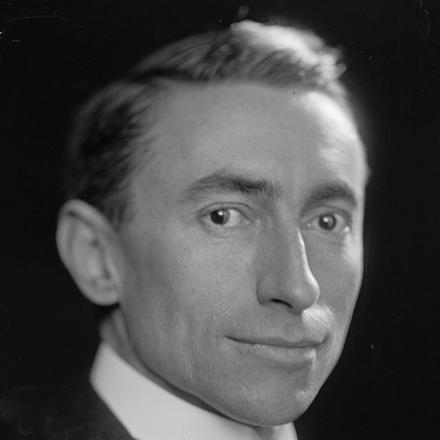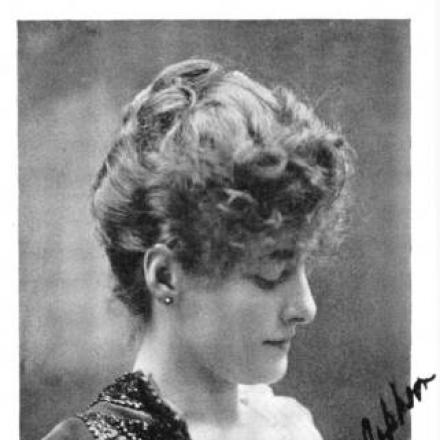Progressi tedeschi sul fronte occidentale
Il 13 agosto tre squadroni dei Royal Flying Corps, partiti da Dover, atterrano in Francia; sono le prime unità ad aver attraversato la Manica per via aerea.
I tedeschi continuano ad avanzare in Belgio: Éghezée e La Garde vengono conquistate; presso Dinant si scatena l’artiglieria. Qui viene ferito uno spilungone di quasi due metri, sicuro di sé e arrogante. Molto arrogante. Per certi versi può essere considerato un avventuriero in cerca di gloria. Di sicuro ha un forte spirito patriottico e una determinazione fuori dal comune. Diverrà un simbolo francese, perché c’è un solo Charles de Gaulle.
Nel 1914, a neanche ventiquattro anni, è già un militare abile come pochi. Comanda un plotone quando viene colpito a una gamba. Cade a terra, sommerso dal cadavere di un sergente. Parlerà di quell’episodio, descrivendo «i tonfi sordi delle pallottole che penetrano nei corpi dei morti e dei feriti sparsi tutt’intorno».
I progressi tedeschi sul fronte occidentale non sono eclatanti, ma comunque evidenti. Nella notte alcuni aerei arrivano a sorvolare Parigi.
La situazione è opposta in Africa: qui sono britannici e francesi a mantenere l’iniziativa. È così sia in Togo, sia in Tanzania.
Nei Balcani l’esercito austro-ungarico attraversa il fiume Drina, ma avanza a fatica. Le strade sono poche e malmesse; il terreno circostante è complesso.
Il Governo italiano smentisce le trattative con l’Intesa. E non potrebbe essere altrimenti. In questi giorni c’è un intenso viavai di Ambasciatori a Roma. Qualcuno è tornato per riferire sugli umori esteri; qualcun altro, come l’austriaco Merey, è stato sostituito e richiamato a Vienna.
Davide Sartori
GLI AVVENIMENTI
Politica e società
- L'Inghilterra e la Francia intimano alla Turchia il disarmo delle due navi tedesche “Goeben” e “Breslau”, entro 24 ore.
- I corrispondenti dei giornali italiani, consigliati a lasciare l'Austria-Ungheria, ritornano in Italia.
Fronte occidentale
- Tre squadroni dell’aviazione reale britannica volano da Dover fino in Francia. Sono le prime unità ad attraversare la Manica per via aerea.
- Francia: i tedeschi assediano La Garde.
- Belgio: i tedeschi controllano Éghezée; Neufchateau è occupata dall’erede al trono tedesco, il Principe Guglielmo.
Fronte meridionale
- Le forze austro-ungariche attraversano il fiume Drina e iniziano la prima invasione della Serbia.
Fronte d’oltremare
- Gli Alleati iniziano ad avanzare da Kamina (Togoland) a Lome.
Operazioni navali
- Africa orientale: le forze navali britanniche bombardano Dar-Es-Salaam.
Parole d'epoca
Hugh Simons Gibson
Segretario della Legazione degli Stati Uniti
Brussels, August 13, 1914.
Last night, after dining late, I went out to find my friend, Colonel Fairholme, and see if he had any news. He had just finished his day's work and wanted some air. Fortunately I had the car along and so took him out for a spin to the end of the Avenue Louise. We walked back, followed by the car, and had a nightcap at the Porte de Namur.
The Colonel has been going to Louvain every day, to visit the General Staff and report to the King as the military representative of an ally. The first time he arrived in a motor with Gen. de Selliers de Moranville, the Chief of Staff. As they drew into the square in front of the headquarters, they saw that everything was in confusion and a crowd was gathered to watch arrivals and departures. When their car stopped, a large thug, mistaking him for a German officer, reached in and dealt him a smashing blow on the mouth with his fist, calling him a "sal alboche" by way of good measure. He had to go in and report to the King, streaming with blood---a pleasant beginning. He is just getting back to a point where he can eat with ease and comfort. Life will be easier for some of the attachés when people get used to khaki uniforms and learn that some do not cover Germans.
The day the General Staff left for the front, the Colonel went to see them off. He was called by one of the high officers who wanted to talk to him, and was persuaded to get on the train and ride as far as the Gare du Luxembourg, sending his car through town to meet him there. Word came that the King wanted to see the Chief of Staff, so he asked the Colonel to take him to the Palace. When the crowd saw a British officer in uniform and decorations come out of the station accompanied by the Chief of Staff and two aides, they decided that it was the Commander-in-Chief of the British army who was arriving and gave him a wonderful ovation. Even the papers published it as authentic. He was tremendously fussed at the idea of sailing under false colors, but the rest of us have got some amusement out of it.
Stories are coming in here about the doings of the German troops. According to reports they came into Hasselt and took the money in the town treasury and the local bank---some two and a half millions altogether. The story, whether true or not, has caused a great deal of ill feeling here. There is another story that the commanding officer of one of the forts around Liège was summoned to parley with a white flag. When he climbed on top of his turret, he was shot through both legs and only saved by his men pulling him to cover. Of course there are always a great many stories of this sort scattered broadcast at the beginning of every war, but in this instance they seem to be generally believed and are doing the Germans no good at all.
Mlle. D-----, one of our stenographers, has a brother in the French army. She has not heard a word from him since the war began, and had no idea where he was. Yesterday a small detachment of French cavalry came along the street. She ran out, called to one of them that her brother was in the -----, and asked where it was. They told her it had not yet been in action and she has been walking on air ever since. But she could not telegraph the good news to her family, for fear of betraying military movements.
Roger de Leval, the 8-year-old son of our friend, practically broke off diplomatic relations with his father and mother because he was not allowed to be a Boy Scout. His father was at the Legation, his mother at the Red Cross, and he had to stay at home with his governess. He felt so badly about it that we had Monsieur de Leval register him as a B. S., and have him assigned to special duty at the Legation. He attends in full uniform and carries messages and papers from my room to the other offices and vice versa. When we go out he rides on the box with the chauffeur and salutes all the officers we pass. They are used to it now and return the salutes very gravely. The youngster now feels that he is really doing something, but is outraged because we go along. He wants to undertake some of the big missions alone.
Princesse Charles de Ligne was in this morning. Her son, Prince Henri, head of that branch of the house, has enlisted as a private in the aviation corps. There seemed to be no way for him to have a commission at once, so he put his star of the Legion of Honor on his private's uniform and was off to the front yesterday. That's the spirit.
Comtesse d'A----- was at their home in the Grand Duchy when war broke out. No news had been received from her, and her husband was worried sick. We got a message through via The Hague and got word back this morning that she was safe and well. I went up to tell him the good news. He was presiding over some sort of committee meeting, and the maid said I could not see him. I insisted that she should announce me and after some argument she did. As the door opened, the buzz subsided and she announced: "Monsieur le Secrétaire de la Légation d'Amérique." There was a terrible cry of fear and the old Count came running out white as a sheet. Before he had come in sight I called out, "Les nouvelles sont bonnes!" The old chap collapsed on my shoulder and cried like a baby, saying over and over: "J'étais si inquiet: J'étais si inquiet!" He soon pulled himself together and showed me out to the car with the honours of war. We send and receive hundreds of telegrams of inquiry and shoot them through in a perfectly routine way. It is only now and then that we come to a realising sense of the human side of it all.
This afternoon I went over and made inquiry as to the well-being of those who are cooped up in the German Legation. They are getting along perfectly well, but are consumed with curiosity as to the progress of the war. The Government has not allowed them to have any letters or newspapers, and they are completely in the dark as to what is going on. I felt like a brute to refuse them, but could not very well do anything against the wishes of the Government. They were decent enough not to embarrass me by insisting, which made it harder to refuse. The son of Hofrath Grabowsky, the Chancellor of the Legation, is Secretary of the German Consulate at Antwerp. He came down here to say good-bye to his father the day war was declared, and lingered so long that he was cooped up with the others. He is liable for military service in Germany, and having left his post at Antwerp at such a time, he must face a court martial whenever he does get home. There are five or six people there, including the wife of the old Hofrath, who are firmly convinced that they will all be murdered in their beds. It is my daily job to comfort them and assure them that nobody now here is giving any thought to them.
Last night I dined with Colonel Fairholme and Kidston, the First Secretary of the Legation. We went to the usually crowded terrace of the Palace Hotel, where we had no difficulty in getting a table in the best part of the balcony. The few other diners were nearly all colleagues or officers. Military motors and motorcycles came and went, and orderlies dashed up on horseback and delivered messages; it looked like war.
The proprietor of the hotel, who has given one hundred thousand francs to the Red Cross, rolled up in his motor from a trip to the front and got out with an armful of Prussian helmets and caps, which he had collected. A crowd gathered round the motor and displayed as much pleasure as though he had brought in a whole German Army corps. The novelty of these souvenirs has not yet worn off.
Women with big tin boxes came by every few minutes to collect for the Red Cross or some other fund. Finally the Colonel protested, and asked if there was no way of buying immunity. That was quickly arranged by giving up five francs, in return for which we were given tags of immunity. Dozens of collectors came by during the evening, but our ostentatiously displayed tags saved us.
We ate at our leisure---out of doors---the first unhurried and unharried meal I have had for days, and then got back to the Legation.
This afternoon the Minister and I went over to see Sir Francis Villiers, the British Minister, and spent half an hour with him. He is evidently all ready to make a quick get-away whenever it looks as though the Germans would come to Brussels. A number of the other diplomats are also prepared to depart. Those who are accredited at The Hague will probably go there, and the others will go to Antwerp. We are too busy here to enjoy the luxury of spending a month undergoing a siege, so no matter what happens, we shall probably not go along. The Minister and I shall take turns from time to time, going up to pay our respects.
Having some things to talk over, the Minister and I went for a drive after our visit, and it was well we did, for when we got back, we found the hall filled with callers. As the tourists and the Germans leave, the war correspondents begin to come in, and in a few days we shall probably have the place full of them. I heard to-day that there were 200 of them in London, and that most of them want to come on here.
Maxwell, the British correspondent, told me this afternoon that he looked for a big engagement at Diest to-morrow or the day after. He has been down through the fighting zone ever since the trouble began, and probably knows more about pending operations than any other civilian.
While I was writing, Z----- came in, suffering from a bad case of panic. He announced as he burst into my office that the Germans were within 20 kilometers of Brussels and were going to occupy the city this evening. He was fairly trembling, but got indignant because I denied it, having just talked with Colonel Fairholme and with Maxwell, both of whom had no more than come back from the front. The fact that it had been published in theSoir was enough for him, and although the news had made him nervous, he hated to have his perfectly good sensation spoiled.
The authorities, so as to be prepared for any eventuality, have this evening published a communiqué to impress upon the population the necessity for abstaining from any participation in the hostilities in case of an occupation. It advises everybody to stay indoors and avoid any words or actions that might give an excuse for measures against non-combatants.
Parole d'epoca
LADY HARRIET JULIA CAMPPBELL JEPHSON
Diario di viaggio
The newspaper are full of German victories and abuse of England. Also they declare that the most terrible atrocities have taken place in Belgium, where women have despatched wounded Germans on the fiel and shot doctors. The indignation is termendous.
"A war-time Jornal, Germany 1914 and German travel notes"
